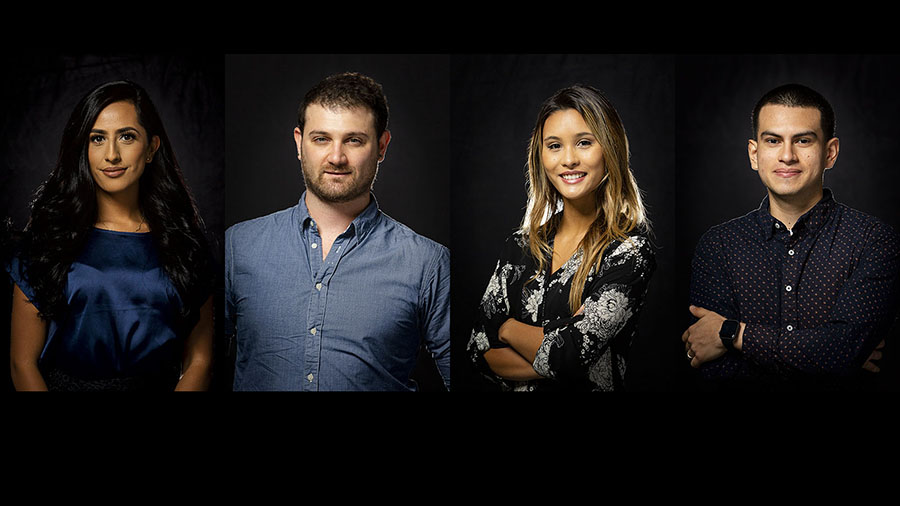
Jan. 25, 2021 — A virtual micro-internship program launched at CSU Channel Islands (CSUCI) during the first months of the pandemic has proved to be so successful, it is continuing through the spring semester with even more participants.
The micro-internships, which are hands-on learning projects with pay, are offered through the Martin V. Smith School of Business & Economics’ (MVS) Entrepreneurship & Small Business Institute (ESBI) with Associate Professor of Marketing Ekin Pehlivan, Ph.D. and Assistant Professor of Management Cynthia Sherman, Ph.D., Director of the ESBI.
“It’s been a learning process, but so far it’s been very successful,” Sherman said. “I think we’re doing really well and have created good relationships in the community. Plus, we’ve received three different grants to help this program continue.”
Micro-internships differ from traditional internships in that traditional internships involve students showing up at a company’s office each day to learn and participate in various aspects of a business. Micro-internships, instead have teams of student interns working on a specific project, which is ideal for the current remote working environment.
Instead of reporting to a company supervisor, student interns report to Pehlivan who developed the micro-internship program after a series of unforeseen circumstances that included the pandemic.
Pehlivan was originally planning to be on sabbatical in order to develop and map out a student-run marketing agency on the CSUCI campus.
“We were planning to launch the program upon my return from leave as I would have prepared the structural and operational components,” explained Pehlivan. “But then COVID-19 hit. I started hearing from students that they were losing their jobs as childcare providers, bartenders or retail workers. Some even told me they were taking out loans. This pushed me to propose a fast-tracked way.”
Instead, Pehlivan proposed the micro-internship concept in which six business students split into two teams to help two local companies with specific projects.
Selena Chavez and Matthew Macrini worked on a rebranding project for PinnPack to better reflect the environmentally-friendly products the plastics manufacturer produces.
“I jumped in immediately at the beginning of the program,” Macrini said. “It’s made a huge difference for me. A lot of my worries about graduating were that I had a lot of knowledge but not a lot of hands-on experience. Now I’ve got work I can point to and say ‘I can get paid to do this.’ It’s something somebody used and it helped them.”
A second team of four worked on a project for Coastal Acupuncture Wellness Center. They helped the company launch a new product by developing the product’s “brand,” requiring them to conduct market research, create a new logo, and create a social media campaign, as well as a new webpage.
The program grew in the fall semester with micro-internships for 10 students, including Brittney Demello, who is working to create content and serve as the account manager for the MVS School of Business & Economics social media page.
“I’m working to create content and I’m also the account manager,” Demello said. “Everyone is super-communicative by telling me when they need something and when they need it by.”
The micro-internship has expanded to 15 students for the spring semester and internships will be available in both Ventura and Santa Barbara counties, thanks in part to three grants. The project earned a $5,000 grant from Adobe through a CSU-wide competition with a project where students are trained in Adobe Creative Suite, which is a collection of programs with which one can create digital and print products.
Another $5,000 grant came from the Outhwaite Foundation in which student interns will work with the Women’s Economic Ventures (WEV) to help small businesses create their online presence. And, J.P. Morgan Chase awarded the micro-internship program $5,000 that will enable the micro-interns to work with the Oxnard Downtown Management District.
The micro-internship program owes its success to a team effort, according to Pehlivan, adding that she and Sherman were supported by MVS School Interim Dean Susan Andrzejewski, Ph.D., MVS School Administrative Analyst Michele Morris, and MVS School Coordinator Paulina Rodriguez, who all worked hard to make sure the legal and payment structures were in place to launch the program.
“One way to offer our students a path to professional careers and entrepreneurship is through the connections we build with our small business partners and industry mentors,” Pehlivan said. “Having a portfolio before they graduate puts them a step ahead of other graduates.”
